 Bosnia and Herzegovina : Safety by City
Bosnia and Herzegovina : Safety by City
Bosnia and Herzegovina is a friendly European country located on the Balkan peninsula.
It was formerly part of Yugoslavia but gained independence in 1992 and it’s full of historic monuments and landmarks that all point to the time while it was a part of former Yugoslavia.
Bosnia and Herzegovina share its borders with Croatia to the north, west, and southwest, Serbia to the east, and Montenegro to the southeast.
It boasts two different areas: one that is mostly mountainous – which is why it was the host to winter Olympic games in the past, and it also has access to a tiny portion of the Adriatic Sea coastline in the south, so it basically has the best of both worlds.
Warnings & Dangers in Bosnia and Herzegovina

OVERALL RISK: LOW
Bosnia and Herzegovina is generally a safe country. Its people are very kind and happy to help, and tourists especially shouldn't encounter any bigger problems in this country. Small towns do not face almost any serious crimes, though that's not the case with its capital, Sarajevo.

TRANSPORT & TAXIS RISK: MEDIUM
Transportation in Bosnia and Herzegovina is overall safe. Just be on the lookout for pickpockets on public transportation, and double-check if the taximeter is on when you enter a taxi.

PICKPOCKETS RISK: MEDIUM
Pickpocketing and bag snatching are the most common form of street crime in Sarajevo, so if you do encounter any problems it will probably be pickpocketing that mostly happens in public transportation. Be extremely careful when entering any bus in this country's capital, since its pickpockets are very skillful.

NATURAL DISASTERS RISK: LOW
In the past couple of years, the only natural disaster that severely affected Bosnia and Herzegovina was flooding of large proportions, with even fatal results. The flooding in 2014 shifted some land mines and also some notices about unsafe areas.

MUGGING RISK: LOW
Mugging exists in this country, but is rare. There have been reports of kidnapping either as a consequence of someone failing to pay a debt, or kidnapping by rival criminal organizations, since this sort of organized street crime is usually the most common of crime. Tourists are not under any sort of threat.

TERRORISM RISK: LOW
Terrorist attacks are more likely to happen in most popular European capitals such as Paris, London etc., than in Bosnia and Herzegovina, even more so because it's mostly inhabited by people of Muslim religion.

SCAMS RISK: HIGH
Any newcomer is in danger of scams when visiting a new country, and the same applies to Bosnia and Herzegovina. The most common scams are people ripping you off in bars or clubs, or by the street vendors, as well as drink spiking in strip clubs.

WOMEN TRAVELERS RISK: LOW
Bosnia and Herzegovina is very safe for women travelers. Attacks rarely happen, if ever, but still, be on the lookout at all times, especially at night, or in deserted areas, empty, poorly lit streets, etc.
So... How Safe Is Bosnia and Herzegovina Really?
Bosnia and Herzegovina is mostly safe for travelers and the biggest threats are of natural disasters, like floods.
Avoid traveling off the beaten path in Bosnia, since the nation is still in the process of clearing many of the estimated 1 million land mines left during the war of 1992-1995.
In rural areas, it is of utmost importance that you stay on paved – a fact that is almost unbelievable but true is that often houses and private property are paved with mines since the time their owners fled during the war.
Pickpocketing, reckless drivers, and petty thefts are almost the norm in Sarajevo and some foreigners have been victims, too, but that’s not common.
Even though the chances for you to be affected, as a foreigner, are small, be wary of petty thieves – small crimes have been on the rise during the recent years.
Still, the country as a whole, crime-wise is much safer than most parts of Europe.
Be very careful when crossing the street, and don’t expect people and drivers to stop.
Traffic culture in this country is poor and you could easily get hurt.
As for health, there are no known dangers, and the tap water is drinkable, except for some parts of Bosnia, like the Posavina Region and Eastern Bosnia, where drinking tap water could result in illness.
How Does Bosnia and Herzegovina Compare?
| Country | Safety Index |
|---|---|
| Bosnia and Herzegovina | 48 |
| Morocco | 54 |
| Austria | 92 |
| Croatia | 83 |
| Italy | 77 |
| Malaysia | 69 |
| Finland | 86 |
| Spain | 83 |
| Botswana | 77 |
Useful Information

Visas
Visa is not required for any stays in Bosnia and Herzegovina that are shorter than 90 days. Be sure that your passport is valid for at least six months from your planned date of return to the country you're visiting. However, if you are not sure about your visa status, visit your local Bosnian embassy which will let you know whether or not you need visa based on your nationality.

Currency
Bosnian Convertible Marka is the currency in Bosnia and Herzegovina. Do avoid street money changers and exchange your money at official exchange offices and you'll find the best rate in the National Bank of Bosnia and Herzegovina. You can also withdraw BCM at a local ATM.

Weather
Bosnia and Herzegovina is surrounded with mountains so it is known to have somewhat warm winters (reaching up to 25℃) and cold winters (reaching to around -5℃). Still, Bosnian climate is considered to be mild.

Airports
Sarajevo International Airport, also referred to as Butmir Airport, is the main international airport in Bosnia and Herzegovina, serving Sarajevo, the capital of Bosnia and Herzegovina. It is located around 6.1 km southwest of the Sarajevo railway station.

Travel Insurance
As in any country, travelers are highly advised to get a travel insurance that covers not only medical issues but also theft and loss of personal items.
Bosnia and Herzegovina Weather Averages (Temperatures)
Average High/Low Temperature
| Temperature / Month | Jan | Feb | Mar | Apr | May | Jun | Jul | Aug | Sep | Oct | Nov | Dec |
|---|---|---|---|---|---|---|---|---|---|---|---|---|
| High °C | 2 | 5 | 10 | 15 | 20 | 23 | 25 | 25 | 22 | 16 | 9 | 3 |
| Low °C | -4 | -2 | 0 | 4 | 8 | 11 | 12 | 12 | 9 | 5 | 1 | -2 |
| High °F | 36 | 41 | 50 | 59 | 68 | 73 | 77 | 77 | 72 | 61 | 48 | 37 |
| Low °F | 25 | 28 | 32 | 39 | 46 | 52 | 54 | 54 | 48 | 41 | 34 | 28 |
Bosnia and Herzegovina - Safety by City
| City | Safety Index |
|---|---|
| Banja Luka | 60 |
| Sarajevo | 48 |
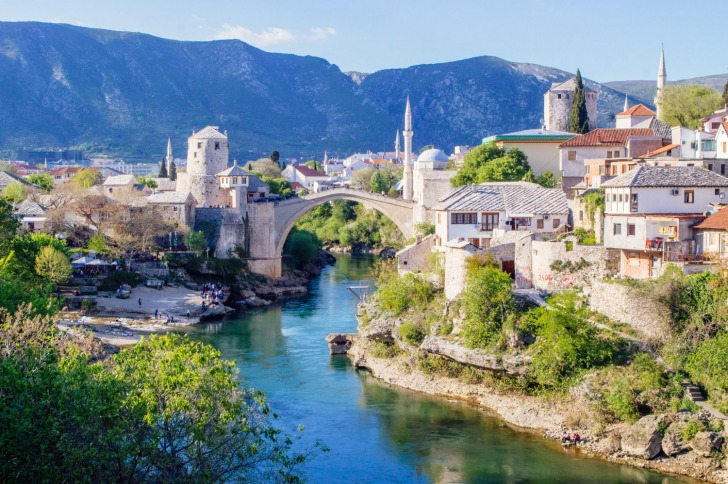
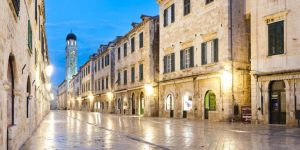
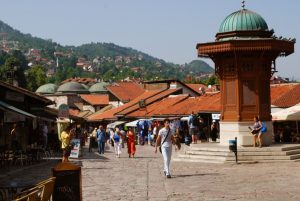
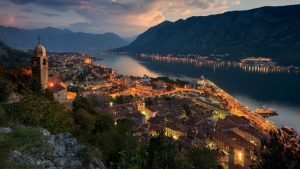
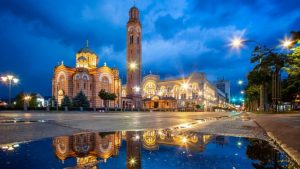
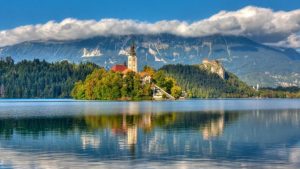
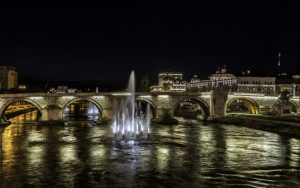





great food
I was last year in Bosnia, I visited Mostar, Tuzla and Sarajevo, in general they could work a little bit on trash around the roads, but all in all it was great. Town called Tuzla is in north east part of Bosnia, couple hours by car away from Sarajevo, it has airport with cheap plain tickets, google it little bit, also it was summer so I went to Tuzla lakes, man made salt lakes. That was awesome. Sarajevo is also great, old city especially. Similar shops you can see in Mostar near the old bridge as well.
We didn’t have any problems at all, lot’s of Bosnians speaks fairly good English. Nice place to see, something different….
I wish it were called Yugoslavia again
I would like to agree. I went to Mostar with a rent a car from Belgrade Serbia and we didn’t even get a scratch on it. The people were very nice. We went to the City Centre and watched the divers off the bridge. They like to impress the tourists. Don’t miss this beautiful historic little town, you won’t regret it. My Aunt who is a Serb from Montenegro lives there and she loves it. She has many good friends that are Croats and Muslims.
Muslim is not a nation.
Bosniacs (Bošnjaci) is a title the majority of Bosnia’s population uses when ask how they identify. Their faith is a Suni form of Islam, which is a leftover from the time of Turkish rule in Bosnia (ca. 1485-1685 a.d.)
Before the fallout of Yugoslavia followed by the war of independence (’90s), they were an unconstitutional minority in the SFRJ Yugoslavia, and during population censuses held each decade, they were forced to choose to identify as to be either Serbs, Croats or Yugoslavs (atheists)… Only when the Republic of BiH was proclaimed as a sovereign country it’s when they finally got their “Bosniacs” identity…
I wish I could call this Country Yugoslavia again
I visited Mostar approx. 2 years ago and it was beautiful!
You must visit the old city centre with it’s beautiful bridge!
There are usually young men diving off the bridge for tourists!
You will be safe but remember to check in with the local police station.
There are Croats and there are Muslims in this city.
You will see many mosques and churches too.
Don’t miss it. It’s worth a stop.
you dont want yugoslavia back.
Yugoslavia was definitely not a great country. it had communism, they killed thousands and thousand people in the name of Tito and communism. you dont want it back, believe me.
Obviously you are ill informed. Yugoslavia had stability and unity during Tito regime. Tito punished the nazi collaborators which were many especially the Croats.Serbs and Jews were massacred by those people and justice was done .Unfortunately many guilty collaborators escaped to Argentina and other countries including USA using false names.
so then you spport yugoslavia killing bosnians?
Emily, it seems you’re not well informed about Yugoslav brand of communism. Yugoslavia broke off with Stalin in 1948 since it refused to be just another soviet puppet state. I was born and raised in Sarajevo, went to high school, spent my summers on the Adriatic coast or traveling to United States, Benelux, Switzerland, Germany, United Kingdom, Tunisia, Egypt… Yugoslav passport was one of the most valuable in the world. We didn’t need a visa to travel to western countries or soviet bloc. I grew up wearing Levi’s, Nike, Adidas, drinking Coca Cola and Pepsi, watching MTV, and bunch of other foreign channels thanks to satellite tv which was available to every citizen. Tito did punish the native Nazi collaborators which is what every country that was involved in WWII did. One of the main source of income for Yugoslavia was tourism. Foreigners from both west and east flocked to the beaches along the Adriatic Sea in summer and to the Olympic mountains around Sarajevo in the winter. I currently live in the US. I don’t know where you’re from and what’s your educational background but I personally find it silly when people try to discuss communism and socialism not knowing the difference between the two, or equating communism in former Soviet Union to the political system in former Yugoslavia. Russian federation is now de jure a capitalist democracy. But de facto it is not. I suggest that you get acquainted with the culture and the way of life in different countries that were made up the former Yugoslavia. Get different opinions from different people, because you’ll get different versions of the events that led up to the country’s collapse and the wars that ensued. Majority of the facts are well known and cannot be disputed, but certain topics that are touchy will be presented differently depending on who you talk to. The truth is often somewhere in between. There is an excellent BBC produced documentary available on YouTube (all 6 episodes) called “Death of Yugoslavia.” There’s also a companion book by the same name. I strongly suggest reading the book and watching the documentary if you’re interested in learning more about former Yugoslavia.
All the best!
Yugoslavia rocks
Thanks JD! Well said – I also lived in Yugoslavia and have the best memories. Going to visit now is not the same …. my dad still says “bring back my Tito”
Complicated but interesting past
My parents are from former Yugoslavia – my dad is from Sarajevo. I definitely agree that everyone remembers things differently especially with regards to why everything fell apart but most people I know from there recall the “Tito times” as being very good and people having a very good life back then. Of course, like with any country, I’m sure there were some people who had it bad/worse than others (romani for example). But that’s in the past now and I do hope all ex-yu countries can have a bright future
Forget about the past!
The disagreement between Serbs and Bosniaks will never end. So how about letting bygones be bygones and focusing on the future? Yougoslavia will never return, so there is no point in saying Bring Back Yougoslavia, knowing it may hurt some people.
I have friends (in Australia) who are Bosnians, Serbs and Croats, and so far, I have not met a single person from the Balnaks that I have not liked. This is because you have so much goodness in common but decide to focus on the past and the differences.
Yugoslavia wasn’t communist nor capitalist. It doesn’t exist today.
No one has mentoined actually how cheap this country is
There is no possibility for exchanging money in streets. You should update you false info.
Actually it is. In Banja Luka (December 2021) at the main square next to Boska shopping mall when entering Gospodska street you will always find guy or two offering exchange. “Deviza, deviza??”
Safe but terrible place
A dear friend of mine lives there, I follow her because she’s amazing and have been for years. She rescues so many animals in this country. Sadly, she posts some of the most shocking pictures of strays who have been poisoned (apparently they are poisoned a lot), or animals dying in the street with a group of people chatting several feet away taking no notice. This place may be safe for people, but if you’re an animal lover, this isn’t where you want to be. Stay away from Sarajevo.
Hi Elizabeth, thank you so much for this information about these poor animals. I have been wondering what happens to the strays, because tragically, so many animals suffer the most horrible, inhumane and painful deaths by poisoning, its shameful. Does your friend have a charity that I can donate to?
Best wishes,
Naomi, UK.
It is not terrible, it is not a rich country
It is not a terrible place, it is a poor place.
It is baffling to me how people form rich countries judges peoples form places where the reality is so different. Rich countries spend fortunes on pets (I love pets, don’t get me wrong) while children go hungry in other places.
You must see the Smart Travel (smarttravel.com.au) page about Bosnia published by the Australian government. Almost everything is described as dangerous, risky and of low-quality. The obnoxiousness of western society is endless.
Are you serious?
Nobody is poisoning animals on the streets here, what are you talking about?! Almost every home has a pet, mostly dog or cat, or both. Many of them adopt strays, instead of buying purebreds. Even I have adopted 4 stray cats that came to my doorstep and I don’t even prefer cats. There might be some cases when animals are treated badly but it’s not a common thing at all.